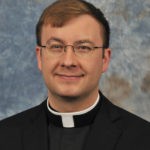By Barb Arland-Fye
Editor
One scene from an energetic production of “Joseph and the Amazing Technicolor Dreamcoat” at St. John Vianney Church in Bettendorf tugged at my heart. The child Benjamin crouches on the floor with his head bowed down in anguish. He does not recognize Joseph, the big brother standing behind him, who is angry about the “stolen” silver goblet found in Benjamin’s bag.

Benjamin’s older brothers sold Joseph into slavery years before, resentful, because their father Jacob showed favoritism toward Joseph. Now the brothers are on their second journey to Egypt to purchase food for their famished family at home. The brothers are at Joseph’s mercy for their survival. None of them recognize Joseph, the powerful lord of Pharaoh’s household and ruler over the land of Egypt.
The unexpected reunion with his brothers gives Joseph insight into God’s plan. “It was really for the sake of saving lives that God sent me here ahead of you,” Joseph tells his brothers after revealing his identity. God “sent me on ahead of you to ensure for you a remnant on earth and to save your lives in an extraordinary deliverance” (Genesis 45:5-7).
Cast and crew at St. John Vianney entertained us with exuberant singing, dancing and hammy acting to convey an ultimately uplifting story of forgiveness, mercy and redemption. A perfect story for Lent, presented March 5-8 to “help you deepen your personal experiences of God during these forty days of Lent and beyond!” Father Jim Vrba, pastor of St. John Vianney, said in the program. “We hope that you are reminded, through the message of this story, to listen to your dreams, never give up hope, and forgive others as God forgives us,” Music Director Eleanor Kiel wrote.
Two days after attending “Joseph,” I substituted as teacher for deacon candidate Brian Dugan’s fifth-grade religious education class in our parish, Our Lady of the River in LeClaire. Brian asked me to focus on the sacraments of reconciliation and anointing of the sick. Our vocabulary focused on confession, penance, reconciliation, reparation, absolution and prayer. We read the story of the Prodigal Son, one of my favorite parables. The students (all girls) and I discussed the ways in which this parable demonstrated forgiveness, mercy and reconciliation.
I asked why the loyal son reacted so bitterly toward his father’s lavish treatment of the prodigal son, returning home after spending his entire inheritance. The girls said because the father showed favoritism toward the prodigal son. On the surface, that response rings true. Over the years, the layers of meaning in this story hopefully will unfold for them, as it continues to unfold for me.
How many of us don’t, at times, feel resentful toward real or perceived favoritism? In our world today, resentment festers and causes people to sell their brother into slavery, to throw him under the bus, so to speak. We may find it difficult to accept mercy bestowed on someone other than ourselves.
Little Benjamin was innocent of wrongdoing but suffered because of the previous actions of his resentful older brothers. The prodigal son’s brother was innocent of wrongdoing but brought on his own suffering because of resentfulness. All of us are in need of God’s forgiveness and mercy. In receiving that gift, we express our appreciation by bestowing forgiveness and mercy on others.
(Contact Editor Barb Arland-Fye at arland-fye@davenportdiocese.org)











